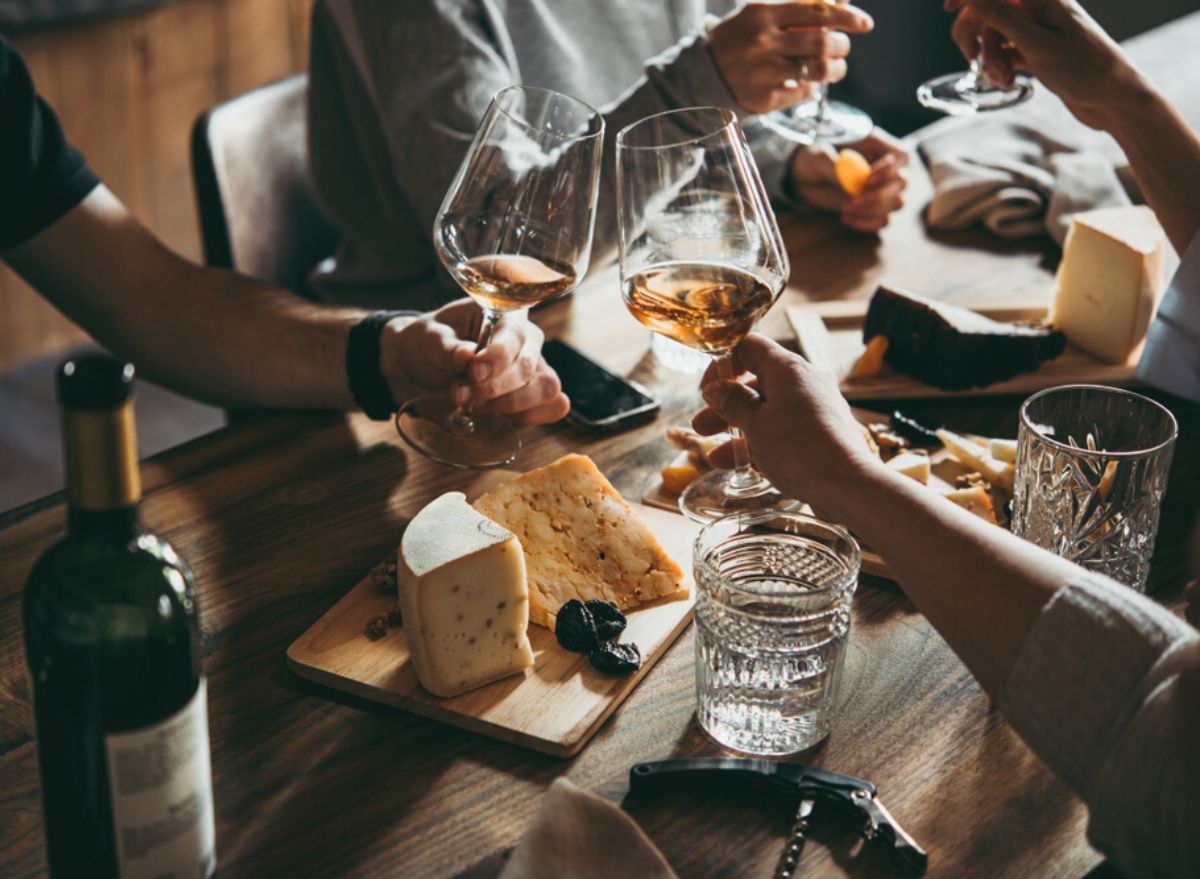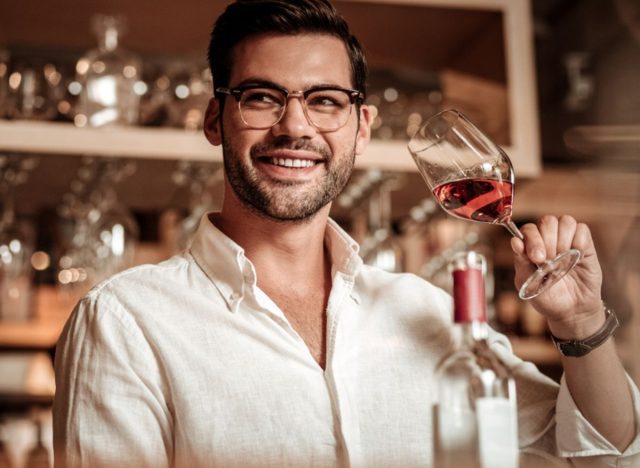#1 Thing to Never Order at a Wine Bar, According to Sommeliers and Chefs

When dining out, thoughtfully pairing wine with food will enhance the experience—and it can make or break it. This is particularly true at wine bars, where vino is specifically emphasized as a core part of the meal, or in the case of wine bars that don’t serve food, the only part of the “meal.” In addition to taste, the fact that wine has some reported health benefits is another reason why you may want make sure to order correctly.
Aside from just avoiding wines made from low-quality ingredients, there are some key tactics to keep in mind when it comes to choosing your glass (or bottle). Just as there are menu items to skip at Italian restaurants, seafood spots, and pizzerias, there are certain things to avoid at a wine bar, and with drinks being such a focal point of the overall experience, this is one type of venue where particular potables are just as taboo as specific food items. According to sommeliers and chefs who work in tandem to pair wine and food effectively, some important takeaways for a successful wine bar order involve evading oxidized wine and spicy foods that might overpower the pairing.
“A wine bar is, by definition, an environment to fully immerse yourself in the amazing diversity of vinous expressions available across this precious planet.” That’s the ethos for Brent Karlicek, certified advanced sommelier and beverage director/co-owner of Postino in Houston. “If a sommelier has taken a chance on bringing something truly unique to the menu, you’re nearly guaranteed a wow factor waiting to happen.”
With that in mind, his wine bar taboo is ordering something familiar. “It’s a missed opportunity to focus on what’s comfortable and right in front of you. While a great sommelier takes care to provide dynamic examples of familiar wines, exploring a region or a grape you’re not familiar with is a guaranteed experience amplification.”
“When you’re at a wine bar and ordering something by the glass, always ask to see the bottle of wine that you’re interested in trying,” suggests James Sparks, owner/winemaker of Kings Carey Wines, as well a winemaker at Liquid Farm, both in Santa Barbara County. The reason? Dreaded oxidization, which can utterly thwart an otherwise quality bottle of wine. “If there’s only a couple of inches of wine left in the bottle that they show you, don’t order that wine. Even when wine bars gas bottles which were previously opened, once the wine level drops to near empty, too much air can get into the bottles and that ruins the wine—it oxidizes it.” Instead, he says it’s best to stick with a wine from a bottle that’s been recently opened. “It will make for a much better tasting experience.”

Nicolás Andrés Martianhes agrees. According to the head sommelier at New York City’s Balvanera, it’s important to preempt any wine order by paying attention to how the wine was preserved. If you see bottles of white or rosé wine out of the fridge, for example, it’s possible that they’re beginning an accelerated oxidation process, thus lessening the quality.
The same applies to red wine if ambient conditions are not adequate (e.g. too warm, or humid). All wines must be kept refrigerated, red or white or otherwise. “It’s a good practice to taste the wine before ordering a glass,” Martianhes notes. “If the wine has been open for a long time, it could be oxidized in addition to other defects. In short, we should not ask for wines that are not preserved in the right conditions, since they cannot be enjoyed correctly or appreciated by our senses.”
In addition to wines that have been stored improperly, another beverage pro recommends skipping house brands and private labels. Mike Rice, beverage director at Alexandria Restaurant Partners, says that more often than not, this could entail price gauging. “Most of the time, the wine bar has made a deal with a supplier, and they will charge a largely marked up price and market as ‘you can’t get it anywhere else.’”
“In the end, I think you should order what you like, but don’t be afraid to venture out of your comfort zone.” So says Ricardo Rodriguez, beverage director at New Jersey’s upcoming Iberian restaurant, Lita. “Tell the staff what you normally like and allow them to guide you towards something new and exciting.” One thing he suggests avoiding, though, is asking for samples. “It might be acceptable at a craft beer bar but it’s frowned upon at wine bars. It’s okay to tell the staff what you don’t care for so you can avoid a recommendation that isn’t to your liking.”
Now that we know the types of wines to watch out for, food pairings are just as important, and the main thing to avoid here is spice.
“Avoid ordering spicy snacks or food as they overpower the wine,” notes Hemant Bhagwani, chef/owner of forthcoming Goa New York. “I would also avoid chocolate and blue cheese with any wine.”
This is especially true when ordering something typically served with wine, like oysters. “If you’re going to order oysters, don’t get them with hot sauce,” proclaims Raymond James Irwin, chief Champagne officer of Fizz Champagne & Bubbles Bar in Sacramento. “It overpowers the oyster’s natural flavor and dulls whatever wine or Champagne you’re drinking.” Instead, he recommends ordering a Blanc de Blancs (100% Chardonnay Champagne) to highlight the minerality of the oyster and the acidity of a mignonette.
Another option? Going for high-acid wines, like Grüner Veltliner, Txakolina, and Cava, all of which are go-tos for Rodriguez. “I like to snack on fatty cured meats and rich salty cheeses. Although I would avoid cheese with red wine, as cheese can have quite a lot of acidity and only exacerbates the acidity, tannins, and the alcohol levels.”
So the next time you’re raising a glass at a wine bar, make sure said glass is full of quality wine that’s been stored properly—and that it’s not paired with hot sauce.









